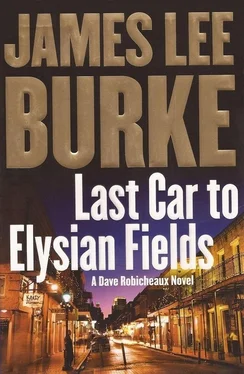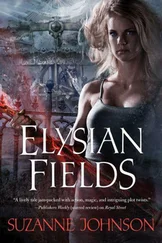Gray spots danced before my eyes.
“Father Dolan and I have nothing to do with your life,” I said.
“Oh, but you do. Two rather nasty cretins just arrived in town, Mr. Robicheaux, the cousins of Frank Dellacroce. Stone killers, they are, sir, with no parameters and no charitable impulses. Evidently a few of the grease balls think you blew poor Frank’s head off. Would you like to hear what they did to a friend of mine?”
“No.”
“Took a blowtorch to him. What’s the name of your cat?”
“Snuggs.”
“What a fine little fellow. Built like a fucking fire hydrant. It’s a shame the innocent suffer. But maybe that’s the only thing that causes us to take action.”
I could feel my heart quicken. “What are you saying?”
“I didn’t make the world. I just live in it as best I can. I’ll be going now.”
“You leave that cat here.”
But he didn’t reply. I heard his chair scrape but did not hear him set Snuggs down. “Coll? Did you hear me?” I yelled.
I heard him banging about in the kitchen, then a hard, clunking sound and his footsteps going heavily through the house and out the front door. By the time I was able to climb out the bathroom window, the yard and the street were empty, the ground puffing with fog, the moon as bright as a white flame behind the skeletal outline of a water oak.
I went around back and entered the house through the kitchen door. A pitcher of milk rested on the drain board and Snuggs was lapping from a bowl next to it, one Max Coll had filled with both milk and dry cat food.
I started to dial 911, then gave it up, propped a chair against the kitchen door, and went back to sleep, my .45 under my pillow.
At 8:05 Monday morning Clotile Arceneaux walked into my office. She wore a pair of navy blue slacks, a blouse printed with tropical flowers, and a polished black gunbelt with her badge holder hung from the front and her cuffs pushed through the back. She had the blackest hair and wore the brightest lipstick I had ever seen.
“How’s life in the Big Sleazy?” I said.
She grinned broadly, then sat down without being asked. “You’re a magnet, Robicheaux,” she said.
“For what?”
“Trouble. We keep a few people at the New Orleans airport, watching to see who comes and goes, know what I mean? Three days ago a couple of grease balls from Ft. Lauderdale got into town, spent the night with some hookers, then caught a flight to Lafayette. Guess what their last names are?”
“Dellacroce?”
“How’d you know?”
“Max Coll was at my house last night.”
“Say again?”
“He was walking around inside my house. He talked to me through the bathroom door.”
She looked up at one corner of the ceiling, her eyelids fluttering.
Then she scratched her neck and looked at me. “I brought mug shots of the Dellacroces. They’re brothers, Tito and Caesar. Tito’s friends call him the Heap, ‘cause he looks like a haystack with eyes. But the mean one is Caesar. He’s short and not very bright.”
“He uses a blowtorch on people?”
“You do know about these guys.”
“Max Coll is tops when it comes to intel.”
“I’ve got to get a job over here. New Orleans just doesn’t cut it.”
“Want to go to lunch later?”
“Like to, slick, but the Big Sleazy calls. I’ve got a little more here on your man Coll.”
“He’s not my man. He’s a meltdown you guys shipped to New Iberia.”
She raised her eyebrows and made an innocent face as she opened a manilla folder in her lap. “The Coll family was hooked up with the IRA for generations,” she said. “Some of them may have been behind the bombing of a pub in Belfast. Some Protestant militants decided to get even and took Max’s whole family out, including an older brother who was a Catholic priest.”
“That’s how he ended up in the orphanage,” I said, more to myself than to her.
She looked down again at the open folder in her lap. “Yeah, that’s right. He was there until he was fifteen,” she said.
“Go to lunch with me,” I said.
She thought about it. “Make it a beignet and a cup of coffee,” she said. She studied me with one eye half closed.
That afternoon I looked down at the booking photos of Tito and Caesar Dellacroce she had left on my desk. Tito, known as the Heap by his peers, stared back at me with eyes that were like cups of black grease. His brother made me think of a ferret in need of a haircut. Both Max Coll and Fat Sammy Figorelli had indicated Frank Dellacroce’s relatives had put his death on me. Maybe. But I believed their real target was still Max Coll, and Max was in New Iberia for reasons other than a religious obsession with Father Jimmie. I believed Max had intimations about where the hit on Father Jimmie had come from, and Max blamed that same person for putting a contract on him and had come to our area to wipe, the slate clean.
Or perhaps he was simply crazy.
Regardless, it was time to dial up Max’s head and see how he liked having things turned around on him. I called the Daily Iberian and scheduled an ad to run in the next day’s personal notices.
“Let me read this back to you,” the clerk said. “‘Max, you owe me $57 .48 for the damage you did to my back door. Why don’t you pay your debts instead of acting like a window-licking voyeur who breaks into people’s houses and molests their pets? Tito and Caesar just blew into town and seem upset because you canceled their cousin’s ticket. Have a nice day — Dave.’”
“Perfect,” I said.
“Mr. Robicheaux, this ad doesn’t make much sense.”
“It does if you’re morally insane,” I replied.
Did you ever have a song in your mind you couldn’t get rid of? For me, at least on that Monday afternoon, it was “Goodnight Irene.” I kept thinking of Junior Crudup sitting on the steps of his cabin in the work camp, playing his twelve-string guitar, singing the words to Leadbelly’s most famous composition, while he waited to catch a glimpse of Andrea LeJeune’s purple Ford convertible passing on the dirt road. Did she arrange for him to return to the house again? Did the guard, Jackson Posey, continue to torment him because of the hatred Posey felt for himself and the lot the world had dealt him?
If God in that moment looked down upon His creations, I wondered if He wasn’t terribly saddened by the level of madness that had become the province of His children.
The song was still in my head when I went that afternoon to Baron’s, the health club where I worked out, and saw Castille LeJeune seated on a hardwood bench in the dressing room, his face bright with sweat from his racquet ball game, a towel wrapped around his neck. He was jovial and expansive, sipping from a glass of ice water while he talked with a group of businessmen, although a sign on the wall stated no glass containers were allowed in the room. It was 5 P.M. and both black and white workers from the salt mines out in the wetlands and the sugar mills that ringed the town burst loudly into the dressing room. Instead of being intimidated by LeJeune’s presence, they treated him as they would a celebrity, greeting him as “Mr. Castille.” Somehow he was one of them, at least for the moment, a patrician who knew them by their first names and spoke both demotic French and English without being patronizing.
There were great differences in the room, but not between the races. The black and white working men spoke the same regional dialect and shared the same political attitudes, all of which had been taught them by others. They denigrated liberals, unions, and the media, considered the local Wal-Mart store a blessing, and regularly gave their money to the Powerball lottery and casinos that had the architectural charm of a sewer works. They were frightened by the larger world and found comfort in the rhetoric of politicians who assured them the problem was the world’s, not theirs. And most heartening of all was the affirmation lent them by a genteel person like Castille LeJeune, a Distinguished Flying Cross recipient who, unlike many members of his class, showed no fear or lack of confidence in their midst, which told them of his respect for their humanity.
Читать дальше












